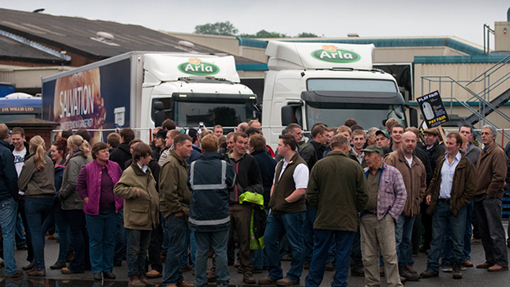Opinion: NFUS milk chief calls for farmer unity

At times of crisis, it is always easy to focus on blame, writes NFU Scotland milk committee chairman Gary Mitchell.
While looking for immediate action and support, it is always important to bear in mind that dairy farmers and dairy processors must also take responsibility and consider the decisions we make for our own businesses.
Now is not the time to assign blame – how we weather the storm is what is most important.
 Gary Mitchell
Gary MitchellNFUS
Milk committee chairman
Whatever you think about the levels of production, milk price and whatever production or volume bonuses are available are still the main drivers.
Back in 2012, NFU Scotland encouraged the industry to adopt milk pricing based on defined formula. That process identified that, at that time, UK average milk prices were 2p/litre less than our EU neighbours. In the past 12 months, our price has been more or less on a par with those in Europe.
However, we have 50% of our production selling into a premium fresh liquid milk market and all that milk should be attracting added value. No other EU country has that added value fresh liquid volume.
See also: Dairy farmers blockade Iceland over 89p milk
The discounts being seen on shop shelves for fresh milk are seeing a premium product being sold at a ridiculous level as a weapon in the retailer price wars.
On the wider dairy category, we are only 85% self-sufficient in the UK.
In dairy terms, we are in quite a different position to our EU neighbours and there can be little justification for processors to drive our farmgate price lower than our competitors.
Feelings are justifiably running high. I have spoken with NFU in recent days and had constructive conversations with both David Handley and John Cummings of Farmers For Action this week.
Tackling the crisis needs a united front if we are to achieve progress. Personally, I don’t support closing factories at this time but respect farmers rights to peaceful protest. However, I am a firm supporter of the need for a consumer-facing campaign at a UK level reminding the public of what the Scottish and UK dairy industry delivers, both in terms of quality produce and the standards on our farms.
While I would support NFUS contributing to such a campaign; I also believe that other organisations drawing funds out of dairy farmers – DairyCo; Dairy UK; Red Tractor – should recognise the crisis and revisit what funds could be redirected towards such an approach.
“Tackling the crisis needs a united front if we are to achieve progress. Personally, I don’t support closing factories at this time but respect farmers rights to peaceful protest.”
Growth in the Scottish or UK dairy market doesn’t necessarily equate to expansion at farm level. It can just as easily apply to growth in the value of our products.
That is why, from an NFU Scotland perspective, we will be pulling together our network of Union milk monitors to an event in early November. At that meeting, we hope to have a representative of all milk purchasers in Scotland present and in a position to explain what contingency plans they have for the short and medium term. It is important for dairy farmers to hear in private how each milk purchaser is dealing with this crisis. That event itself may focus minds on what further action is needed, backed up by a survey of our milk members, due to be issued.
The milk monitor meetings around the country that I have attended in recent weeks have shown that many dairy farmers already have a good appreciation of the problems brought about by the global downturn and the difficulties that lie ahead.
If dairy farmers are interested in attending our meeting, we would welcome their engagement. And I would encourage any milk member with concerns to pick up the phone to myself, policy manager George Jamieson and or their milk committee representative.
As a farmer, some wrongly believe that I only support growth and big farmers. Regardless of size, it is efficient well-run farms that always impress me the most, and the majority of those are found in the 160-cow family-run units that make up the backbone of the Scottish industry.
I am not on a family farm. I employ 12 young people with little or no dairy experience, but they make up a strong team enthusiastic about our industry. My system is not the most profitable but strives to be sustainable, efficient and bring as many youngsters into the sector as possible.
The Scottish Dairy Hub, due to be launched at AgriScot will also help drive modern apprenticeships and introducing new people passionate about dairying to the sector. Its wider work will also help the industry become more efficient and sustainable in the future.
The industry needs both growth and resilience but right now it needs crystal-clear communication between processors, supplying dairy farmers and their producer representatives. Difficult times such as these can spark innovation and new ideas but the focus, quite rightly, is on resilience.
The NFUS contact number is 01314 724 000.
